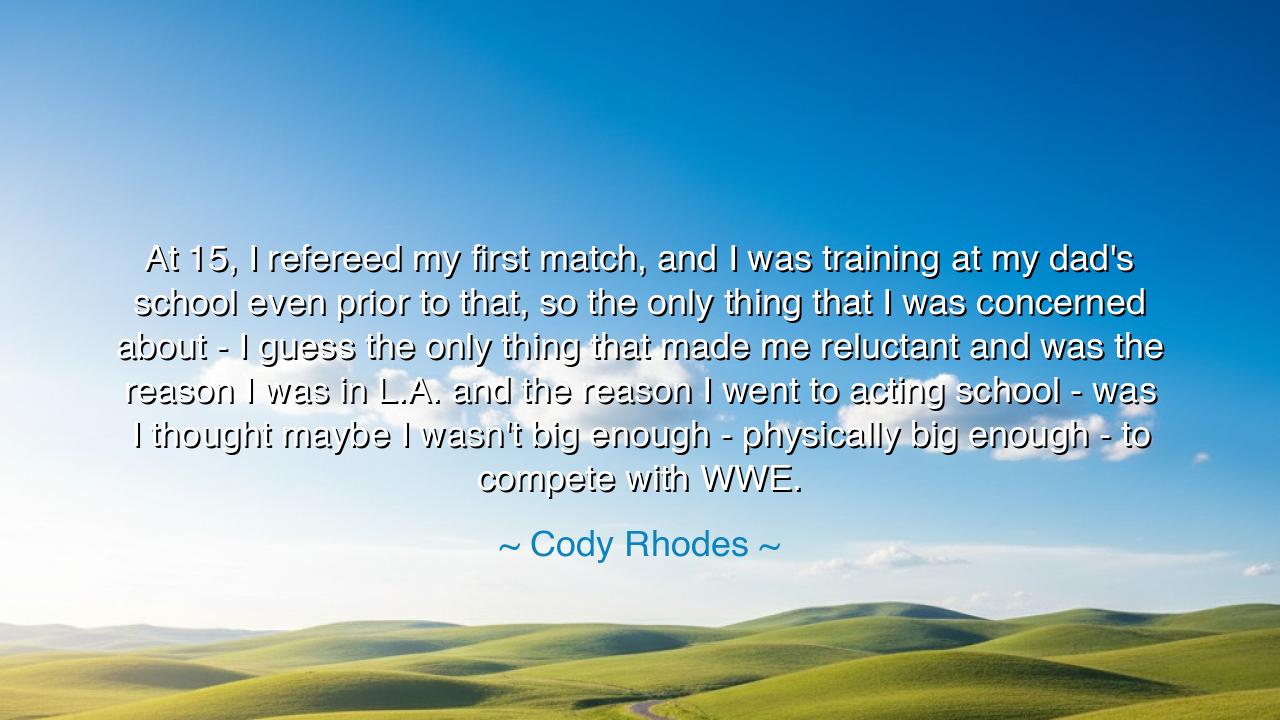
At 15, I refereed my first match, and I was training at my dad's
At 15, I refereed my first match, and I was training at my dad's school even prior to that, so the only thing that I was concerned about - I guess the only thing that made me reluctant and was the reason I was in L.A. and the reason I went to acting school - was I thought maybe I wasn't big enough - physically big enough - to compete with WWE.






The words of Cody Rhodes — “At 15, I refereed my first match, and I was training at my dad’s school even prior to that, so the only thing that I was concerned about — I guess the only thing that made me reluctant and was the reason I was in L.A. and the reason I went to acting school — was I thought maybe I wasn’t big enough — physically big enough — to compete with WWE” — carry the weight of a timeless struggle: the battle between heritage and self-doubt, between destiny and fear. In them, we hear the voice of a young man standing at the threshold of greatness, born into a legacy yet questioning if he is strong enough to bear its weight. It is a confession both humble and heroic — a reminder that even those destined for greatness must first wrestle with the shadow of insecurity.
Rhodes, the son of the legendary Dusty Rhodes, grew up in the golden dust of wrestling rings, where giants walked and legends spoke in thunder. From his earliest years, he trained, observed, and lived within that sacred arena where power, charisma, and courage defined manhood. And yet, he reveals here the heart of the ancient paradox: that true strength begins not in the body, but in the soul. He feared not failure, but inadequacy — not defeat, but the idea that he might not measure up to the myth that surrounded his father’s name. Thus, his journey westward, to Los Angeles and to acting school, was not an escape from destiny, but a pilgrimage of preparation — a quest to discover the strength within that could one day equal the legacy without.
Throughout history, many have stood at such a crossroads. Alexander the Great, even as a youth, was haunted by the fear that he might never surpass his father, King Philip of Macedon. He felt himself too young, too untested, too small against the vast shadow of greatness cast before him. Yet it was precisely this fire of inadequacy that drove him to conquer worlds his father never dreamed of. So it is with Cody Rhodes: his self-doubt became the forge in which ambition was tempered into resolve. The fear of being "not big enough" became the very force that made him grow beyond mere physical strength — into the strength of heart, vision, and perseverance.
There is a profound nobility in Rhodes’ honesty. For while the world often glorifies the confident, the ancients knew that humility is the first teacher of greatness. To admit one’s doubt is not to yield, but to prepare for mastery. The man who questions his own worth is often the one who works hardest to prove it true. And in that toil, he builds something greater than muscle — he builds character. The wrestling ring, then, becomes more than an arena of combat; it becomes the symbol of every human struggle, where the spirit must fight not just the opponent before it, but the weakness within.
Rhodes’ journey into acting before returning to wrestling also mirrors the hero’s journey told in the epics of old. Like Odysseus, who wandered far from Ithaca only to return wiser and stronger, Rhodes left the path expected of him to discover who he truly was. Acting trained him to channel emotion, to understand identity, to wear the mask and the truth beneath it. What seemed a detour was, in fact, the shaping of his artistry — the transformation from a son following footsteps into a man forging his own. When he finally returned to wrestling, he did so not as Dusty Rhodes’ son, but as Cody Rhodes, master of his own destiny.
The heart of this quote, then, lies in a revelation that every generation must face: inheritance does not guarantee greatness. We may be born among giants, but we must still earn our own height. Strength is not a gift; it is a construction of will, effort, and faith. The young man who doubts his worth and still dares to try is already stronger than he knows. Rhodes’ early fear — that he was not “big enough” — became the soil in which his greatness took root. For it is through uncertainty that courage is proven, and through effort that legacy is fulfilled.
Let this be the lesson for all who hear it: do not despise your doubts, nor flee from the shadows of those who came before you. Your fear of inadequacy is not your enemy; it is your invitation to rise. Be like Cody Rhodes — stand before the giants of your lineage, not in envy or despair, but in determination. Build your foundation, master your craft, and let your spirit prove what your flesh may doubt. For no man is born “big enough” for his destiny; he must grow into it, through discipline, humility, and fire.
Thus, the wisdom of Cody Rhodes’ words is eternal: greatness is not inherited — it is built. And the moment you turn fear into fuel, the moment you answer doubt with work and faith, the world ceases to measure your size and begins to witness your strength.






AAdministratorAdministrator
Welcome, honored guests. Please leave a comment, we will respond soon